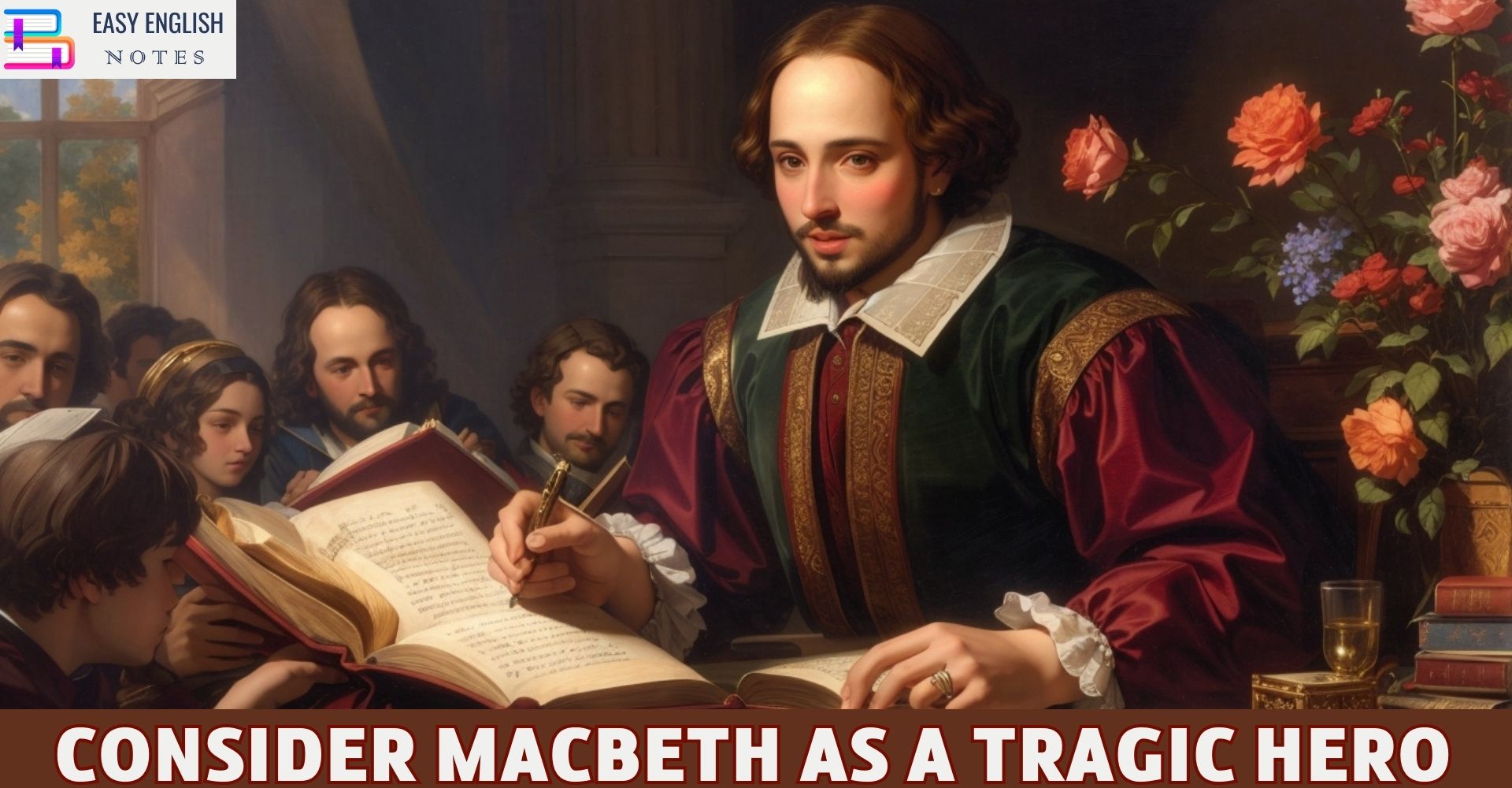“The tragic hero with Shakespeare need not be good, though generally he is good, and therefore at once gains our sympathy in his error. But it is necessary that he should have so much greatness that in his error and fall we may be vividly conscious of the possibility of human nature”. (Bradley). It follows, therefore, that Shakespearean tragedy is the story of “the ruin of a grave and noble nature through the existence of some serious, inherent weakness brought into contact with the special hostile circumstances calculated to defeat it.” The Shakespearean tragedy, therefore, leaves the impression of a spiritual havoc at the fall of the curtain and impresses us with deepest pathos and mystery of life,
The case with Macbeth is slightly different. The hero in this tragedy is by no means a noble man like Hamlet or Othello, though he is great like them. Macbeth outwardly appears to be a bloodthirsty hound reveling in murders and bloodshed. He coldly butchers a distinguished guest and a number of innocent persons to make himself secure on the throne of Scotland. But Shakespeare has so presented his hero that he at once enlists our sympathy and admiration in spite of all his villainy and treachery. Boyer says that “Two things are necessary to arouse tragic emotions when a villain is the hero of a play: the hero must have so much greatness in his character as to call forth our admiration, and make us conscious of the possibilities of human nature and there must be an internal struggle represented.” Shakespeare has done something more to enlist deeper sympathy and admiration for his hero.
First, Shakespeare has introduced supernatural powers in order to raise this loathsome story of murder and bloodshed to the higher plane of real tragedy and to impart to the deeds of Macbeth a kind of grandeur, awe and sublimity. The Weird Sisters goad him on ward to crime in spite of his moral disgust and horror for murder and blood-shed. Macbeth feels helpless in the presence of these invisible forces of evil and sin. We pity Macbeth for his helplessness when be says,
Why do I yield to that suggestion
Whose horrid image doth unfix my hair
And makes my seated heart knock at my ribs
Against the use of nature?
The Weird Sisters are “a reminder of the existence and immanence of more things in heaven and earth than are dream of in our everyday philosophy. a warning that at all times, but worst in its lapses, humanity has to reckon with not flesh and blood alone but principalities and power of the unseen world.” Therefore, “we feel that we are not in the presence of the simple murder of a king but in that of a cosmic tragedy which although it has realistic features. cannot be related to our ordinary life.” We sympathise with Macbeth because “he is helpless as a man in a nightmare; he may struggle but cannot fight; he can no more resist than a rabbit resist a weasel’s teeth fastened in its neck, or a bird the serpent’s transfixing eye.”
Also Read :
- Compare Hamlet with Macbeth, Othello and other Tragedies
- “The Pardoner’s Tale” is the finest tale of Chaucer
- Prologue to Canterbury Tales – (Short Ques & Ans)
- Confessional Poetry – Definition & meaning
- Line By Line Explanation Of The Poem The Eve of St. Agnes
Second, Shakespeare has presented so much internal struggle in the heart of Macbeth that the play ceases to be a mere story of murder and bloodshed and becomes a tragedy of the soul. Shakespeare has laid bare the heart of Macbeth stung with a thousand scorpions and we know not whether to pity Macbeth or hate him. He is horrified at the very thought of murder, and bids the stars hide their light to conceal his black and deep desires.” He comes out with the decision: “We shall proceed no further in this business.”
The fatal vision of the blood-stained air-drawn dagger, the horrible mutterings of the sleeping grooms in the murder-chamber, the bleeding corps of Duncan and his filthy hands cause a spiritual havoc in his heart and give him all the tortures of hell. He sincerely wishes Duncan to come back to life again:
“Wake Duncan with thy knocking! I would thou couldst !”
From the core of his heart he says, “Had I but died an hour before this chance I had lived a blessed time?” We can not help sympathising with a murderer of so noble a nature.
Further to alleviate the guilt of Macbeth’s crimes Shakespeare has created Lady Macbeth as the hero’s counterpart. Macbeth could not have committed the murder without the spur of his wife. It is she who incites him to commit/ murder in spite of himself. She is the real murderer of Duncan and not Macbeth who had already pronounced; “We shall proceed no further in this business.”
She confesses that she could have murdered the king herself if he had not resembled her father. The larger share of the guilt of Duncan’s murder must go to her. This is why she pays a more terrible penalty than Macbeth himself. In her heart burns the blazes of hell and therefore the gentlewoman in attendance on her rightly says, “I would not have such a heart in my bosom for the dignity of the whole body.”
With these devices Shakespeare enlists our sympathy and pity for his hero. Miller even refuses to accept Macbeth as a villain like Iago. He says that Macbeth possesses the feelings, the instincts, the tendencies which belong to men of the very highest type, out of which the noblest character could have been built Hostile circumstances and supernatural forces had vanquished his moral and spiritual life. “For such a one, pity is hardly possible. And yer his unconquerable resolution compels Some sympathy. Our chief, thought is how grand he might have been how beneficent his whole career. if he had but made the right decision when his time of trial came. His end solemnly reminds the truth of the saying that “the corruption of the best is of all things worst”
For sweetest things turn sourest by their deeds
Lilies that fester smell fur worse than weeds.
In conclusion, Shakespeare’s portrayal of Macbeth epitomizes the intricate complexity of tragic heroes. Macbeth’s journey, while fraught with villainous deeds, is underscored by internal struggles, cosmic influences, and the manipulation of fate. The interplay of these elements elicits profound emotions from the audience—sympathy for the internal torment Macbeth endures and an understanding of the “what could have been” aspect of his character. Shakespeare’s masterful manipulation of supernatural forces, internal conflicts, and the influence of secondary characters creates a tapestry that resonates with human experiences and emotions. The tragic downfall of Macbeth becomes a canvas upon which the audience contemplates the vast realm of human potential, and ultimately, the fragility of greatness.
PLEASE HELP ME TO REACH 1000 SUBSCRIBER ON MY COOKING YT CHANNEL (CLICK HERE)











